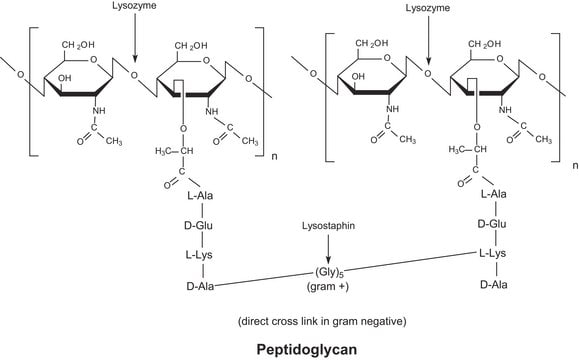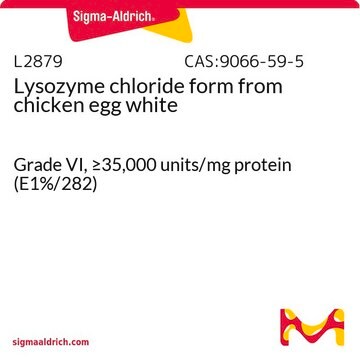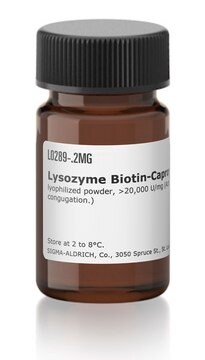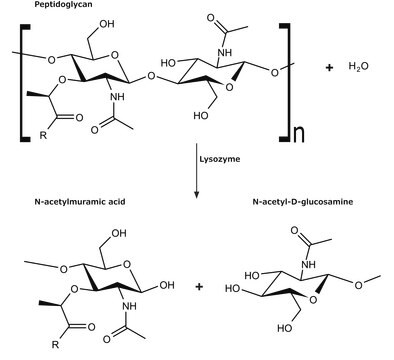Wszystkie zdjęcia(1)
Key Documents
10837059001
Roche
Lysozyme
from hen egg white
Synonim(y):
Mucopeptide N-acetylmuramoyl-hydrolase, Muramidase, lysozyme
Zaloguj sięWyświetlanie cen organizacyjnych i kontraktowych
About This Item
Polecane produkty
pochodzenie biologiczne
chicken egg white
Poziom jakości
Próba
≥95%
Postać
solid
aktywność właściwa
>23000 U/mg (Shugar units)
masa cząsteczkowa
14.4 kDa
opakowanie
pkg of 10 g
producent / nazwa handlowa
Roche
optymalne pH
6.0-7.0
absorpcja
3.9 at 280 nm (10 mg enzyme/ml)
Opis ogólny
Muramidase, Mucopeptide N-acetylmuramoyl-hydrolase
Zastosowanie
Lysozyme has been used for:
- Cell wall degradation
- Preparation of protoplasts
- Bacteriolysis
- Pharmacology (anti-inflammatory effect on mucous membrane; healing of tissue; protection against bleeding; normalization of mucus secretion; dissolution of pyrogens; potentiation of antibiotics)
- Food and drinks (flavor enhancer)
- Sample preparation prior to isolation of nucleic acids
Lysozyme has been used in the monitoring of transcription by real-time -PCR and sample preparation.
Działania biochem./fizjol.
Lysozyme hydrolytically cleaves the bonds between N-acetyl-D-glucosamine and N-acetylmuramic acid residues (GlcNAc β1-4Mur) in mucopolysaccharides and the glycan skeletons of the corresponding peptidoglycans (the latter are glycosaminoglycans linked to or crosslinked by peptide chains). Lysozyme effectively destroys the cell walls of bacteria.
Definicja jednostki
One Shugar unit is that quantity of enzyme in 1 ml of a suspension of Micrococcus luteus of pH 7.0 whose initial absorbance at a wavelength of 450 nm is 0.750 for a pathlength of 10 mm which causes the absorbance to decrease at the rate of 0.001 per minute, all measurements being carried out at a temperature of +25 °C.
Uwaga dotycząca przygotowania
Working solution: Lysozyme hydrochloride is readily soluble in water and buffer solutions but insoluble in organic solvents.
Storage conditions (working solution): -15 to -25 °C
Aqueous solutions of the hydrochloride (2 mg/ml dist. water) can be stored for several days at 2 to 8° C or at -15 to -25° C for several weeks.
Storage conditions (working solution): -15 to -25 °C
Aqueous solutions of the hydrochloride (2 mg/ml dist. water) can be stored for several days at 2 to 8° C or at -15 to -25° C for several weeks.
Rekonstytucja
Prepare a stock solution at a concentration of 50 mg/ml in dist. water. Dispense into aliquots and store at -15 to -25 °C. Discard each aliquot after use.
Przechowywanie i stabilność
Store at 2 to 8 °C. (Store dry!)
Inne uwagi
For life science research only. Not for use in diagnostic procedures.
This page may contain text that has been machine translated.
Kod klasy składowania
11 - Combustible Solids
Klasa zagrożenia wodnego (WGK)
WGK 2
Temperatura zapłonu (°F)
does not flash
Temperatura zapłonu (°C)
does not flash
Certyfikaty analizy (CoA)
Poszukaj Certyfikaty analizy (CoA), wpisując numer partii/serii produktów. Numery serii i partii można znaleźć na etykiecie produktu po słowach „seria” lub „partia”.
Masz już ten produkt?
Dokumenty związane z niedawno zakupionymi produktami zostały zamieszczone w Bibliotece dokumentów.
Klienci oglądali również te produkty
A new iron acquisition system in Bacteroidetes.
Manfredi P, et al.
Infection and Immunity (2014)
Visualization of RNA 3? ends in Escherichia coli Using 3? RACE Combined with Primer Extension
Xun Wang, et al.
Bio-protocol, 8(5) (2018)
Kimberly M Davis et al.
Infection and immunity, 79(2), 562-570 (2010-11-03)
Bacterial pathogens that colonize mucosal surfaces have acquired resistance to antimicrobials that are abundant at these sites. One of the main antimicrobials present on mucosal surfaces is lysozyme, a muramidase that hydrolyzes the peptidoglycan backbone of bacteria. Cleavage of the
Yuriy Rebets et al.
Methods in molecular biology (Clifton, N.J.), 1539, 99-144 (2016-12-03)
The choice of an expression system for the metagenomic DNA of interest is of vital importance for the detection of any particular gene or gene cluster. Most of the screens to date have used the gram-negative bacterium Escherichia coli as
Blanca López-Méndez et al.
European biophysics journal : EBJ, 50(3-4), 411-427 (2021-04-22)
Microscale thermophoresis (MST), and the closely related Temperature Related Intensity Change (TRIC), are synonyms for a recently developed measurement technique in the field of biophysics to quantify biomolecular interactions, using the (capillary-based) NanoTemper Monolith and (multiwell plate-based) Dianthus instruments. Although
Nasz zespół naukowców ma doświadczenie we wszystkich obszarach badań, w tym w naukach przyrodniczych, materiałoznawstwie, syntezie chemicznej, chromatografii, analityce i wielu innych dziedzinach.
Skontaktuj się z zespołem ds. pomocy technicznej






